Learning through investigation: Science on Stage visit to El Roure Gros primary school Inspire article
The Catalan primary school El Roure Gros has a unique concept: all learning is done through experimentation and investigation. Science on Stage Germany invited eight teachers from Austria, Germany and Italy to visit the school.
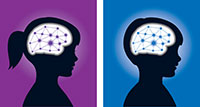
iStockphoto
At first glance, the building of El Roure Gros in Santa Eulàlia de Riuprimer does not resemble a school at all. It is small and very simple; only the yard gives the impression of a public institution. In April 2012, eight primary-school teachers travelled to Spain to look behind the façade of this very special school.

Stage Germany
The idea of the excursion came about in 2011 at the Science on Stage international teaching festivalw1 in Copenhagen, where Carmen Alemany, head of El Roure Gros, and her colleague Eloi Arisa presented the concept behind their school. One of the board members of Science of Stage Germany, Ute Hänsler, realised how much other European teachers could benefit from a visit, and primary-school teachers who had attended the festival were invited to take part.
In the 1980s, Carmen Alemany decided that the school should break with administrational rules, and this break still determines the style of learning and teaching today: there is no separation of school subjects, no bell ringing at a certain time to mark the end of a lesson, and classroom doors are not closed. At El Roure Gros, all learning is integrative, interdisciplinary and project-based. The students themselves can propose topics and work on them independently or in small groups. The projects usually last one week and are documented on paper and with computers in a portfolio. The students only approach their teachers if they are stuck with their project.
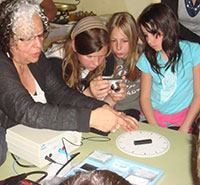
Image courtesy of Monica Zanella
Inquiry and communication are the main competences taught at El Roure Gros. The key for this concept of teaching and learning is the documentation of all learning processes. The pupils begin with drawings in kindergarten, and go on to learn how to write and read because of the need to apply these skills for their own documentation. They are not taught knowledge, but how to gain knowledge themselves. The aim of this concept is to raise independent young people who are capable of taking responsibility and initiative. During the two-day visit, the Science on Stage teachers had the opportunity to see this concept in action.
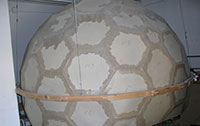
Image courtesy of Wilfried Meyer
The two-storey building houses 142 pupils and 12 teachers. The pupils are allocated to the kindergarten (ages 3 to 5), the initial circle (6 to 7), the middle circle (8 to 9) and the upper circle (10 to 11), although doors are left open to encourage communication and collaboration between groups. Much of the work in the school is based on co-operation: between teachers, between pupils, and between teachers and pupils. The school is equipped with 60 laptops and desktop computers, a small sound studio and a planetarium built by the pupils. The everyday language is Catalan, although Spanish is taught from an early age, and older pupils learn English.
Excursions to science centres, museums, industry or natural surroundings take place every three months. The school aims to include the natural and social surroundings, such as the village, its inhabitants and its geography, in the teaching process. “A child is born with a lot of innate knowledge,” explains Carmen, “but it needs to get to know its natural and social surroundings, and its customs. The teacher needs to accompany the child in its process of exploring its surroundings.”
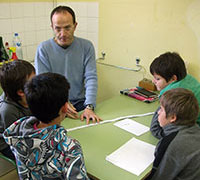
Image courtesy of Claudia Jacob
The school’s aim is not to produce young scientists and engineers but to raise confident and independent humans. The pupils of El Roure Gros perform outstandingly well in public tests compared with other Catalan primary-school students. And the side effect of this concept: approximately 70% of El Roure Gros alumni have chosen careers in mathematics, science or engineering.
The visiting primary-school teachers were impressed with what they saw. “The atmosphere was one of respect and the children were taken seriously: the teachers responded to all the children’s thoughts and questions,” said Monica Zanella from Italy. Wilfried Meyer and Kirstin Yüzüncü from Germany commented, “We were amazed to see what a school can achieve with such limited resources when it doesn’t have to constantly struggle with standards, competencies, exam-oriented content; at El Roure Gros, all the teachers’ energy is poured into the children, their interaction with the world and their education.”
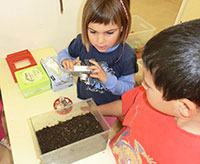
Image courtesy of Science on Stage Germany
Although it may not be possible for all teachers to recreate the El Roure Gros concept in their own schools – particularly in countries like Germany where school curricula are structured quite strictly – they can take away useful ideas. One important aspect that could be adopted at any school is more open documentation of the learning process. In the occasional lesson, teachers could also reduce their involvement, allowing children to take the lead in deciding what topics to explore, and how they want to document them. In this way, children gain the spirit of exploration while learning.
Thanks to its unusual concept, the Catalan primary school El Roure Gros is a prototype for schools throughout Europe: competence-based learning in inspiring learning environments –successful, sustainable and suitable for children.
Acknowledgement
Science on Stage Germanyw2 would like to thank Claudia Jacob, Wilfried Meyer, Carina Peschek and Monica Zanella for their contributions to this article, and THINK ING for supporting the teacher excursion to El Roure Gros.
Web References
- w1 – Science on Stage is a network of local, national and international events for teachers, initially launched in 1999 by EIROforum, the publisher of Science in School. At each national Science on Stage event, a delegation of teachers is selected to represent their country at the Science on Stage international teaching festival.
- The next international festival will be held on 25-28 April 2013, in Słubice-Frankfurt (Oder) on the Polish-German border. During the festival, 350 teachers from 27 countries will share their most innovative teaching ideas in workshops, on-stage performances and the teaching fair. Participation is free for delegates. For other science teachers, there will be a limited number of places for which a registration fee will be charged. See the Science on Stage Europe website for details.
- w2 – Learn more about Science on Stage Germany





